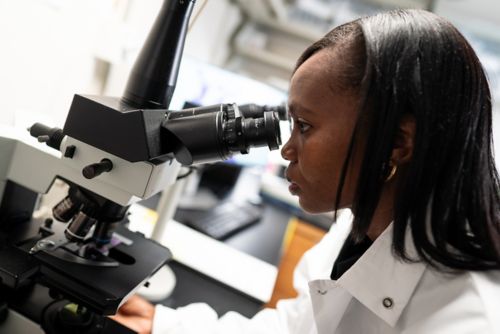St. Jude Family of Websites
Explore our cutting edge research, world-class patient care, career opportunities and more.
St. Jude Children's Research Hospital Home

- Fundraising
St. Jude Family of Websites
Explore our cutting edge research, world-class patient care, career opportunities and more.
St. Jude Children's Research Hospital Home

- Fundraising
Ruth Wang’ondu, MD, PhD
Developing targeted therapies for hematologic malignancies driven by aberrations in transcription factors
Overview
Some children with B-cell acute lymphoblastic leukemia (B-ALL) respond poorly to the standard of care treatment and have poor prognoses. A transcription factor, IKZF1, has been shown to be a prognostic marker of B-ALL, specifically of high-risk B-ALL. My work aims to understand how genetic variations of IKZF1 contribute to leukemogenesis and drug resistance.

Research Summary
Children diagnosed with B-ALL have an overall survival rate greater than 90%. However, some patients still respond poorly to treatment and experience poor outcomes. Next-generation sequencing data have shown that some of these patients with poor outcomes have mutations in a transcription factor called IKZF1 (IKAROS family zinc finger 1). IKZF1 encodes a DNA-binding protein involved in chromatin remodeling and hematopoietic differentiation. It is a tumor suppressor of ALL, and its deletion stops B-cell development early on. Patients with IKZF1 deletions have an increased risk of experiencing relapse and high-risk disease. In addition to deletions, numerous point mutations have been identified in IKZF1 and are linked to immunity diseases.
I use in vitro and in vivo models of B-ALL to understand how IKZF1 variants impact leukemogenesis and drug resistance. Some of my work focuses on a particular missense mutation—N159Y—that occurs in less than 1% of B-ALL patients. My research addresses how this variant modulates gene expression and facilitates chromatin remodeling.
Since the standard of care treatments are not as effective for those harboring IKZF1 mutations, a better understanding of IKZF1 biology and its contribution to leukemogenesis will allow us to develop more targeted treatment strategies and, thus, positively impact survival rates.

Clinical impact
My experience as a pediatric hematology-oncology clinician, along with my expertise in understanding the molecular mechanisms driving oncogenesis, allows me to provide unique insight into the translational potential of our research.
Genetics of diverse populations
Those of Hispanic and Latino descent have a much higher risk of developing ALL and have lower survival rates compared to other ethnic groups. IKZF1 variants largely contribute to this phenomenon. I am interested in understanding how the genetics of diverse populations impact ALL incidence.

Selected Publications
Meet the team

- Dev Bondage, PhD
- Senior Researcher
About Dr. Wang’ondu
Dr. Wang’ondu is a pediatric hematology-oncology clinician who received her MD and PhD in Cell Biology at Yale University. She then completed a residency in Medicine and Pediatrics at the Yale New Haven Hospital in Connecticut. In 2022 she joined St. Jude Children’s Research Hospital as a Pediatric Hematology-Oncology Fellow and is currently an Instructor in the Department of Oncology.
Dr. Wang’ondu is board certified in General Pediatrics from the American Board of Pediatrics and Internal Medicine from the American Board of Internal Medicine. She received a Physician Recognition Award in Continuing Medical Education from the American Medical Association (2022). She is a member of the Children's Oncology Group (COG) Acute Lymphoblastic Leukemia Biology Sub-Committee; COG Acute Lymphoblastic Leukemia Disease Group High risk B-ALL Trial Task Force (Risk Stratification); COG Acute Lymphoblastic Leukemia Disease Group, Standard risk B-ALL Trial Task Force (Risk Stratification); American Society of Hematology Health Equity Task Force.
Dr. Wang’ondu is researching the impact of IKZF1 genetic variants on hematologic malignancies.

Affiliations
Contact us
Ruth Wang’ondu, MD, PhD
Instructor
Clinical Education & Training
Department of Oncology
MS 343, Room D4036
St. Jude Children's Research Hospital

Memphis, TN, 38105-3678 USA GET DIRECTIONS